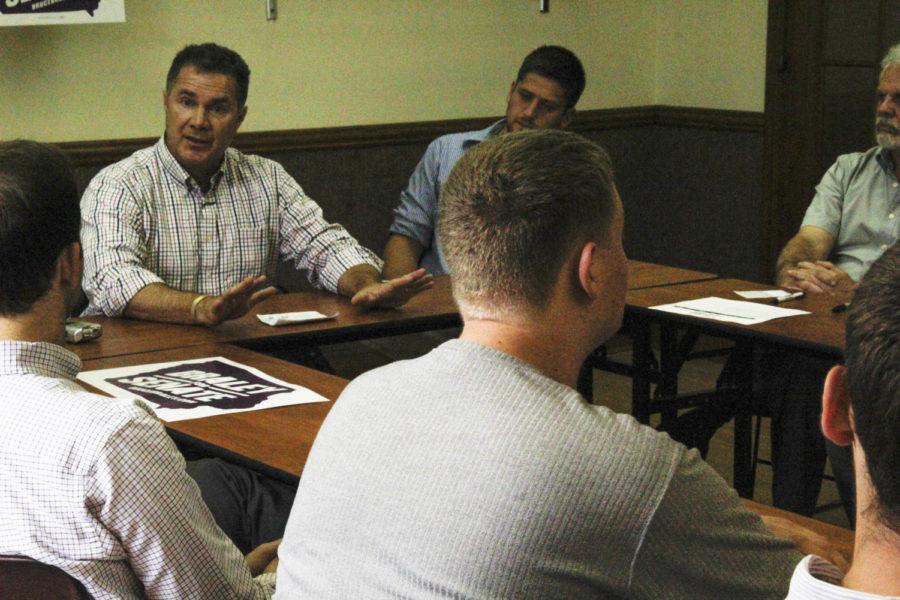Bruce Braley visits students, discusses loan debt
Danielle Ferguson/Iowa State Daily
U.S. Rep. Bruce Braley, D-Iowa, visited Iowa State’s campus Aug. 26 to discuss college affordability and student loan interest rates.
August 26, 2014
David Parkinson’s dream is to join the Peace Corps, but he isn’t sure if he will be able to afford the endeavor on top of paying back his student loans.
U.S. Democratic Rep. Bruce Braley, who is running for Tom Harkin’s seat in the U.S. Senate, visited Iowa State on Aug. 26 to discuss this issue with students as part of a college campus tour.
According to Braley, Iowa has the sixth highest student debt upon graduation in the nation at almost $30,000 of debt per student. About 71 percent of Iowa college students take on some sort of debt before they graduate.
When Braley attended Iowa State in the 1970s, federal loan interest rates were between 1 and 2 percent. When he was elected to Congress in 2006, he said the interest rates were about 6 percent. A compromise was set at about 3.4 percent.
“When we invest in you, we get a big return on that when you leave here with less debt and have more money to spend,” Braley said. “The more we can do to keep interest rates low, it has an enormous benefit for students in terms of the interest debt they take away when they graduate.”
Parkinson has a bachelor’s degree in classical studies and is returning to finish up a history degree. He works three jobs and still needs to take out both private and federal loans to pay for college. His parents made just enough money to make him ineligible for a Pell grant.
Going into humanitarianism, he said, might not be the most financially stable choice for him.
“With the debt I’ve accumulated, how will I pay for the Peace Corps?” Parkinson said. “That’s something I’ve always wanted to do, but I just don’t think I can do it because it’s not feasible.”
On a national basis, about 57 percent of undergraduate seniors in the 2012-13 school year graduated with debt. At Iowa State, that percent was about 64.5, according to a Board of Regents’ docket item.
Braley listened to 10 other student testimonies and one from a parent about how they are paying for college, their personal struggles with student debt and their main concerns with increased interest rates.
Wade and Wyatt Klooster are both fifth year civil engineers with political science minors. The twin brothers both took out loans to pay for school and have jobs to help manage costs. They have two siblings and all four of them have either attended college or are enrolled.
They preferred not to disclose the amount of student debt they will have upon graduation but said they have “a lot.”
“My biggest concern is can I pay off my loans in a manageable time frame and still live in a comfortable life?” Wyatt Klooster said.
Blake Miller, junior in political science, gave an example of a family member who is in his 50s and is still paying off student loans. He shared his view of a bigger picture involving the economy.
“If students coming out of college are saddled with so much debt, they aren’t able to contribute to the economy,” Miller said.
Braley’s interests for office include keeping federal interest rates lower than 6 percent and extending legislation that would extend the college affordability tax credit, a legislation that allows students to take credit of up to $2,500 each year.
Republican opponent Joni Ernst has called for the closing of the Department of Education to decrease government involvement, which Braley said would cause higher interest rates for students in the private marketplace.
A statement published Aug. 25 by Stephanie Turner, senior at Simpson College and a member of Students for Joni, on Ernst’s website said: “Joni Ernst is a mother who cares deeply about education and went to college partially on government aid herself. Today’s attacks are just another case of Bruce Braley resorting to desperate tactics, but we’re smarter than he gives us credit for. Students across Iowa deserve better than Braley’s misleading attacks.”
Braley also said he would like to see students be able to refinance their loans like someone would refinance a home.
“This is a very common problem,” Braley said about student loan debt. “There’s been a strong emphasis on education in Iowa, so a lot of working class students know that their ticket to a better way of life is to get more education … to make sure they can pursue it, [some] may have to take on debt.”







